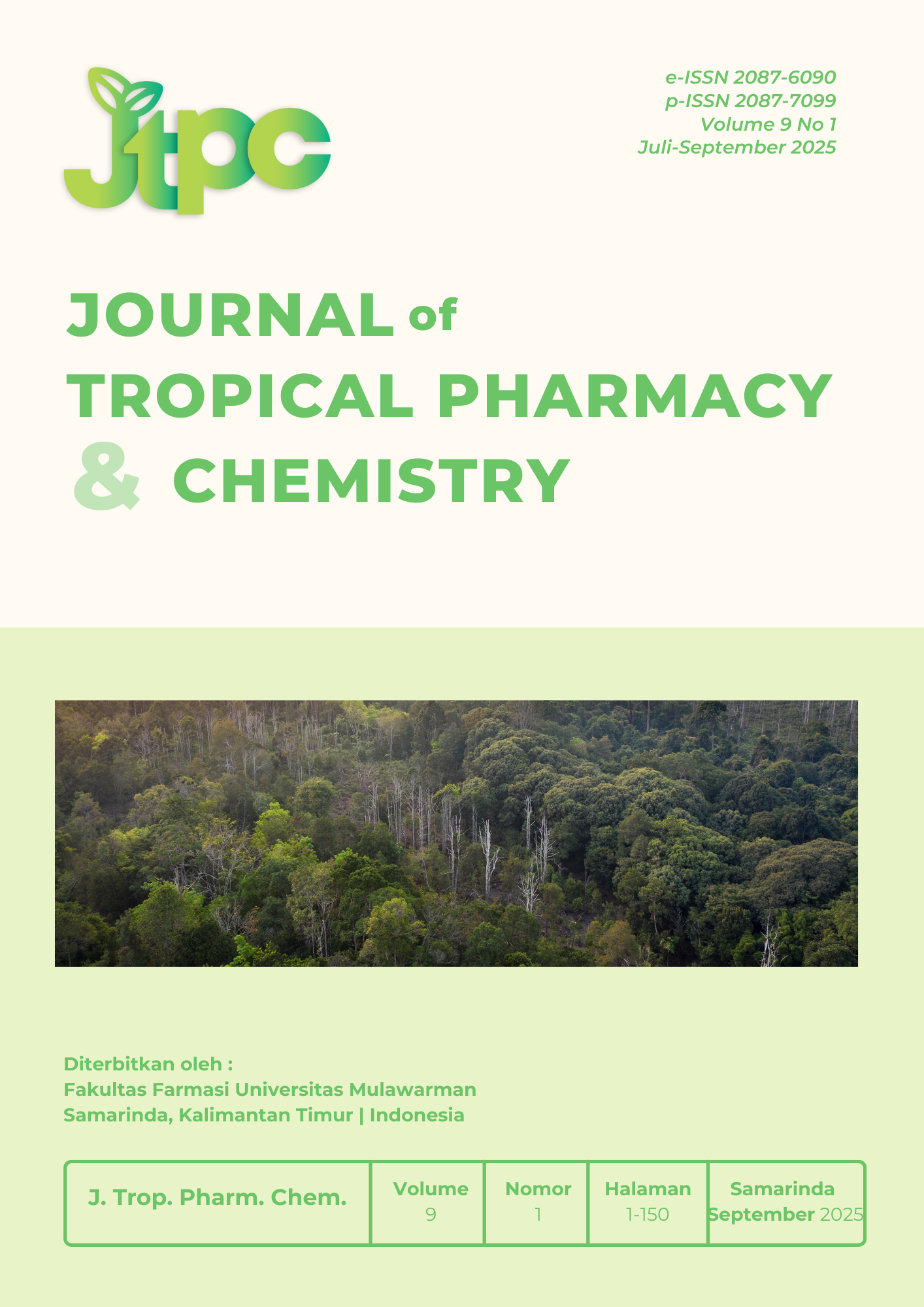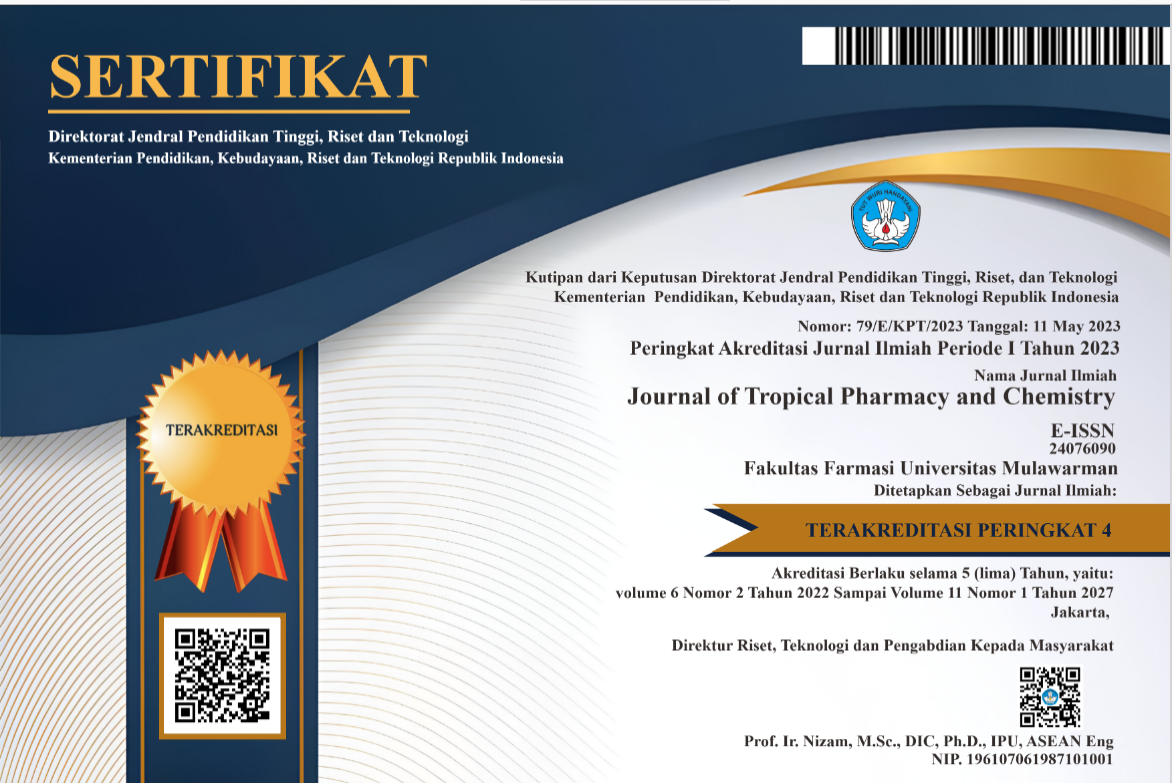The Impact of Flavonoids from Fruits and Vegetables on Cognitive Function in Dementia
DOI:
https://doi.org/10.30872/jtpc.v9i1.295Keywords:
flavonoids, dementia, cognition, neuroprotection, dietary polyphenols.Abstract
Flavonoids are polyphenolic phytochemicals abundant in fruits and vegetables that have attracted attention for their potential neuroprotective effects. Dementia, marked by progressive cognitive decline, has limited effective treatments, prompting interest in nutritional approaches. This review synthesizes existing preclinical and clinical evidence of flavonoids-particularly anthocyanins, flavanols, flavonols, and isoflavones-and their potential effects on different cognitive domains and dementia subtypes. Mechanistic pathways (antioxidant, anti-inflammatory, neuroplasticity, vascular, gut-brain axis) are discussed, along with factors influencing flavonoid efficacy, methodological limitations, and directions for future research. Overall, the evidence suggests modest but promising cognitive benefits of dietary flavonoids, especially for Alzheimer's disease, though more rigorous human trials are needed. Recommendations for dietary guidance and translational implications are highlighted.
Downloads
References
1. Aarsland, D., Borda, M. G., Kramberger, M. G., et al. (2023). A randomized, placebo-controlled trial of purified anthocyanins on cognition in individuals at increased dementia risk. The American Journal of Geriatric Psychiatry. Advance online publication.
2. Bakoyiannis, I., Daskalopoulou, A., Pergialiotis, V., & Perrea, D. (2019). Phytochemicals and cognitive health: Are flavonoids doing the trick? Gériatrie et Psychologie Neuropsychiatrie du Vieillissement, 17(1), 75–86.
3. Bensalem, J., Dudonné, S., Gaudout, D., et al. (2019). Polyphenols from grape and blueberry attenuate cognitive decline in healthy elderly subjects: A randomized, double-blind, placebo-controlled clinical trial. Journals of Gerontology: Series A, 74(7), 996–1007.
4. Bieschke, J., Russ, J., Friedrich, R. P., et al. (2010). EGCG remodels mature α-synuclein and amyloid-β fibrils into non-toxic off-pathway aggregates. Proceedings of the National Academy of Sciences, 107(17), 7710–7715.
5. Brickman, A. M., Khan, U. A., Provenzano, F. A., et al. (2014). Enhancing dentate gyrus function with dietary flavanols improves cognition in older adults. Nature Neuroscience, 17(12), 1798–1803.
6. Cassidy, A., et al. (2020). Habitual intake of flavonoid subclasses and incident dementia. American Journal of Clinical Nutrition, 112(2), 343–353.
7. Cheatham, C. L., & Sheppard, K. W. (2022). Enhancing the cognitive effects of flavonoids with complementary approaches: A review. Frontiers in Neuroscience, 16, 833202.
8. Commenges, D., Scotet, V., Renaud, S., Jacqmin-Gadda, H., Barberger-Gateau, P., & Dartigues, J. F. (2000). Intake of flavonoids and risk of dementia. European Journal of Epidemiology, 16(4), 357–363.
9. Czank, C., Cassidy, A., Zhang, Q., et al. (2013). Human metabolism and elimination of the anthocyanin, cyanidin-3-glucoside: A (13)C-tracer study. American Journal of Clinical Nutrition, 97(5), 995–1003.
10. D’Archivio, M., Filesi, C., Varì, R., Scazzocchio, B., & Masella, R. (2010). Bioavailability of polyphenols: Status and controversies. International Journal of Molecular Sciences, 11(4), 1321–1342.
11. Dai, W., et al. (2020). Epigallocatechin gallate (EGCG) for mild cognitive impairment: A randomized, double-blind, placebo-controlled trial. Nutrients, 12(10), 3106.
12. Devore, E. E., Kang, J. H., Breteler, M. M. B., & Grodstein, F. (2012). Dietary intakes of berries and flavonoids in relation to cognitive decline. Annals of Neurology, 72(1), 135–143.
13. Do Rosario, V., et al. (2024). Anthocyanins through diet and supplementation: Protocol for an umbrella review and meta-analysis. BMJ Open, 14(9), e086435.
14. Ehrnhoefer, D. E., Bieschke, J., Boeddrich, A., et al. (2008). EGCG redirects amyloidogenic polypeptides into unstructured, off-pathway oligomers. Nature Structural & Molecular Biology, 15(6), 558–566.
15. File, S. E., Hartley, D. E., Elsabagh, S. M., Duffy, R., & Wiseman, H. (2005). Cognitive improvement after six weeks of soy supplements in postmenopausal women is limited to equol producers. Journal of Nutrition, 135(10), 2589–2595.
16. Gardener, S. L., Rainey-Smith, S. R., & Martins, R. N. (2021). Intake of anthocyanins, flavanols, and flavanones and cognitive function: Narrative review. Frontiers in Aging Neuroscience, 13, 640381.
17. Godos, J., Cincione, R. I., Castellano, S., et al. (2024). Dietary (poly)phenols and cognitive decline: A systematic review and meta-analysis. Molecular Nutrition & Food Research, 68(11), 2300472.
18. Henderson, V. W., St John, J. A., Hodis, H. N., et al. (2012). Long-term soy isoflavone supplementation and cognition in women: A randomized, controlled trial. Neurology, 78(23), 1841–1848.
19. Hoang, L. N., et al. (2025). Natural compounds and extracts for cognition in AD/MCI: A systematic review and meta-analysis of RCTs. Frontiers in Aging Neuroscience, 17, 1531278.
20. Holland, T. M., Agarwal, P., Wang, Y., Leurgans, S. E., Bennett, D. A., Booth, S. L., & Morris, M. C. (2020). Dietary flavonols and risk of Alzheimer dementia. Neurology, 94(16), e1749–e1756.
21. Huang, W., et al. (2021). Baicalein and tau pathology: Modulation of GSK-3β and cognitive outcomes in Alzheimer models. Biomedicine & Pharmacotherapy, 137, 111307.
22. Jeong, J. W., Lee, W. S., Shin, S. C., et al. (2018). Luteolin inhibits LPS-induced neuroinflammation via NF-κB suppression in microglia. International Immunopharmacology, 59, 21–29.
23. Joseph, D. K., et al. (2023). Aerobic exercise and dietary flavonoids on cognitive impairment: Systematic review and meta-analysis. Frontiers in Physiology, 14, 1216948.
24. Khalifa, K., Aarsland, D., et al. (2020). Purified anthocyanins and cognition in people at risk for dementia: Systematic review. Frontiers in Neurology, 11, 916.
25. Krikorian, R., Shidler, M. D., Nash, T. A., et al. (2010). Blueberry supplementation improves memory in older adults. Journal of Agricultural and Food Chemistry, 58(7), 3996–4000.
26. Kuczmarski, M. F., Evans, M. K., Zonderman, A. B., et al. (2024). Association between flavonoid intake and executive function among diverse older adults (HANDLS). Nutrients, 16(9), 1968.
27. Lamport, D. J., Pal, D., Moutsiana, C., et al. (2015). The effect of flavanol-rich cocoa on cerebral perfusion in healthy older adults: A placebo-controlled, crossover, acute trial. Psychopharmacology, 232(17), 3227–3234.
28. Lee, J. W., Lee, Y. K., Ban, J. O., et al. (2019). EGCG attenuates amyloid pathology and neuroinflammation in APP transgenic mice. Brain Research, 1712, 86–95.
29. Letenneur, L., Proust-Lima, C., Le Gouge, A., Dartigues, J. F., & Barberger-Gateau, P. (2007). Flavonoid intake and cognitive decline over a 10-year period. American Journal of Epidemiology, 165(12), 1364–1371.
30. Lorzadeh, E., et al. (2025). Anthocyanins and cognition: A systematic review and meta-analysis. Nutrients, 17(1), Article e0000.
31. Manach, C., Williamson, G., Morand, C., Scalbert, A., & Rémésy, C. (2005). Bioavailability and bioefficacy of polyphenols in humans. I. American Journal of Clinical Nutrition, 81(1 Suppl), 230S–242S.
32. Mastroiacovo, D., Kwik-Uribe, C., Grassi, D., et al. (2015). Cocoa flavanol consumption improves cognitive function, blood pressure control, and metabolic profile in elderly subjects: The CoCoA randomized controlled trial. American Journal of Clinical Nutrition, 101(3), 538–548.
33. Mekhora, C., et al. (2024). Effect of polyphenols on inflammation related to cognitive decline: A systematic review. Nutrition and Healthy Aging, 14(1), 1–18.
34. Neshatdoust, S., Saunders, C., Castle, S. M., et al. (2016). High-flavonoid intake induces cognitive improvements linked to changes in cerebrovascular function: A randomized trial. Nutrition and Healthy Aging, 4(3), 233–246.
35. Panche, A. N., Diwan, A. D., & Chandra, S. R. (2016). Flavonoids: An overview. Journal of Nutritional Science, 5, e47.
36. Paterson, K. G., et al. (2021). Green tea catechins, endothelial function, and white matter hyperintensity progression in older adults. Nutrients, 13(7), 2423.
37. Pietta, P.-G. (2000). Flavonoids as antioxidants. Journal of Natural Products, 63(7), 1035–1042.
38. Rendeiro, C., Rhodes, J. S., & Spencer, J. P. E. (2015). The mechanisms of action of flavonoids in the brain: Therapeutic potential in aging. Pharmacology, Biochemistry and Behavior, 135, 85–99.
39. Rendeiro, C., Vauzour, D., Rattray, M., et al. (2013). Dietary levels of flavonoids improve spatial memory and reverse age-related neuronal deficits in mice. PLoS ONE, 8(5), e63535.
40. Shukitt-Hale, B., Lau, F. C., & Joseph, J. A. (2008). Berry fruit supplementation and neuronal signaling in aging: Targeting the membrane. Journal of Agricultural and Food Chemistry, 56(3), 636–641.
41. Shukitt-Hale, B., Carey, A. N., Jenkins, D., Rabin, B. M., & Joseph, J. A. (2015). Beneficial effects of fruit polyphenols on neuronal signaling and behavior. Advances in Nutrition, 6(5), 576–592.
42. Small, G. W., et al. (2018). Memory and fMRI changes after grape-derived polyphenol supplementation in individuals with memory complaints. Experimental Gerontology, 111, 79–85.
43. Sorond, F. A., Lipsitz, L. A., Hollenberg, N. K., & Fisher, N. D. L. (2008). Cerebral blood flow response to flavanol-rich cocoa in healthy elderly humans. Neuropsychiatric Disease and Treatment, 4(2), 433–440.
44. Spencer, J. P. E. (2008). Flavonoids: Modulators of brain function? British Journal of Nutrition, 99(E-Suppl 1), ES60–ES77.
45. Spencer, J. P. E. (2010). The impact of fruit flavonoids on memory and cognition. British Journal of Nutrition, 104(S3), S40–S47.
46. Tingö, L., et al. (2024). Whole-diet interventions and memory/cognition in healthy older adults: A systematic review. Trends in Geriatric Healthcare, 8(2), 101–118.
47. Tsolaki, M., Karatsoli, M., Lazarou, I., et al. (2020). Pomegranate juice supplementation in Alzheimer’s disease: A randomized controlled trial. Journal of Alzheimer’s Disease, 78(4), 1359–1370.
48. Vauzour, D., Vafeiadou, K., Rodriguez-Mateos, A., Rendeiro, C., & Spencer, J. P. E. (2008). The neuroprotective potential of flavonoids: A multiplicity of effects. Nutrition Research Reviews, 21(2), 187–206.
49. Vauzour, D., Camprubi-Robles, M., Miquel-Kergoat, S., et al. (2017). Nutrition for the ageing brain: Towards evidence for an optimal diet. Ageing Research Reviews, 35, 222–240.
50. Whyte, A. R., Cheng, N., Fromentin, E., & Williams, C. M. (2018). A randomized, double-blinded, placebo-controlled study to investigate the effects of chronic wild blueberry supplementation on cognitive function in older adults. European Journal of Nutrition, 57(6), 2445–2457.
51. Williams, R. J., Spencer, J. P. E., & Rice-Evans, C. (2004). Flavonoids: Antioxidants or signalling molecules? Free Radical Biology and Medicine, 36(7), 838–849.
52. World Health Organization. (2023). Dementia. https://www.who.int/news-room/fact-sheets/detail/dementia
53. Youdim, K. A., Dobbie, M. S., Kuhnle, G., et al. (2004). Flavonoid permeability across an in situ model of the blood–brain barrier. Free Radical Biology and Medicine, 36(5), 592–604.
54. Youdim, K. A., Shukitt-Hale, B., & Joseph, J. A. (2004). Flavonoids and the brain: Interactions at the blood–brain barrier and their physiological effects. Free Radical Biology and Medicine, 37(11), 1683–1693.
55. Zhang, Y., Li, S., Xu, Y., et al. (2021). Genistein as add-on therapy to cholinesterase inhibitors in mild-to-moderate Alzheimer’s disease: A randomized, double-blind, placebo-controlled trial. Nutrients, 13(5), 1602.
56. Zhang, Y., et al. (2022). Anthocyanin supplementation improves cognition and reduces tau in older adults with early Alzheimer’s pathology: A randomized trial. Nutrients, 14(xx), Article 0000.
57. Zhao, L., et al. (2020). Anthocyanins reduce Aβ deposition and improve synaptic function in APP/PS1 mice. Journal of Neuroinflammation, 17(1), 264.
Downloads
Published
Issue
Section
License
Copyright (c) 2025 Josephine Retno Widayanti, Nanny Djaja, Linawati Hananta, Jimmy Fransisco Abandita Barus, Siti Setiati, MI Widiastuti (Author)

This work is licensed under a Creative Commons Attribution-NonCommercial 4.0 International License.




